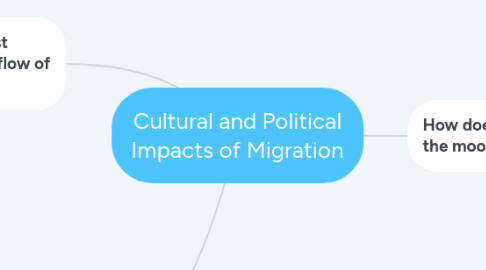Cultural and Political Impacts of Migration
저자: KAVYA RAMINENI

1. How is the politics of a host country affected by the inflow of migrants?
1.1. The inflow of migrants can have both positive and negative effects on the politics of a host country.
1.2. It can lead to cultural, ethnic and religious diversity, which can create new social and political dynamics, but also social and political tensions.
1.3. Migrants can bring new ideas and skills, contribute to the economy and increase diversity.
1.4. An influx in migrants can can also strain social services, create competition for jobs, and lead to cultural and political conflicts.
1.5. For example, the 2015 refugee crisis in Germany led to the rise of the far-right Alternative for Germany party and increased anti-immigrant sentiment (Kanstroom, 2018).
1.6. In the United States, the debate over immigration has become a major political issue, with the Trump administration implementing strict immigration policies and building a wall at the Mexican border (“Immigration Policy,” 2021).
2. Sources
2.1. Kanstroom, Dan. Aftermath: Deportation Law and the New American Diaspora. Oxford University Press, 2018.
2.2. "Immigration Policy." Council on Foreign Relations, councilonforeignrelations.org/topic/immigration-policy.
3. How does cultural change affect the mood of the population?
3.1. The diverse cultures in a country lead to more cultural appreciation through festivals. This increases the time contributed towards families, therefore making the population happier and less stressed due to less workload.
3.2. Culture sometimes leads to many complex and time consuming rituals which can be stressful
3.3. Almost every culture teaches you different ways to handle life and situations.
3.4. Sometimes, cultures are not allowed to be practiced in some places. People who follow such are alienated, have restricted rights, etc.
3.5. Example: A case report of bereavement in an Ethiopian female refugee highlighted the importance of culture in the expression of grief. Her grief symptoms were exacerbated by her inability to perform her culturally sanctioned purification rituals due to her relocation. To make matters worse, she was repeatedly misdiagnosed due to the use of Western-derived diagnostic criteria and clinicians' lack of understanding of cultural differences in the presentation of grief.


